Operating a diesel-powered commercial fleet is costly to the environment, costly to a company’s public image and costly to its financial health. Ignoring the problem and doing nothing simply allows those costs to grow. However, for those unable to transition to full electric mobility a readymade alternative to diesel capable of reducing CO2e by 90 per cent, is now available for instant implementation
Everyone knows the story about ostriches burying their head in the sand to avoid facing up to trouble. Except, it isn’t true. Ostriches do sometimes put their head into the ground. But research has shown that it’s not so that they can ignore predators, it’s because they are using their beaks to turn their eggs, which are nesting in shallow holes in the sand.
However, the ‘Ostrich Effect’ on the other hand, is a very real thing. It was first identified by finance professors Dan Galai and Orly Sade in 2005 in a research paper entitled ‘The ‘Ostrich Effect’ and the Relationship Between the Liquidity and Yields of Financial Assets.’ The effect can be summarised as a cognitive bias where people tend to ‘bury their head in the sand’ to avoid potentially negative information, often relating to finance.
Most of us do it to some degree or another, whether it’s putting just one more meal on the credit card or putting off that pension review for just one more year. Succumbing to the Ostrich Effect is not good on a personal level, but it can be absolutely catastrophic on a business level.
Unfortunately, the transport business, and particularly the diesel-powered fleet sector, is suffering from an ‘Ostrich Effect’ pandemic.
Once hailed as a solution to curb global warming because of its lower CO2 emissions, diesel’s usage was once strongly advocated by the UK government and European Union during the 1990s as engine technologies advanced. Notable promotions included incentives such as reduced taxes for diesel vehicles under the UK’s Vehicle Excise Duty system to encourage drivers to switch from petrol. This policy was driven by the belief that diesel engines were more efficient and cleaner. However, this perception shifted dramatically following revelations like the 2015 VW emissions scandal, which exposed that diesel vehicles were not as environmentally friendly as once thought, undermining the trust in ‘clean diesel’ claims and prompting a re-evaluation of diesel’s role in the UK’s transport strategy.
Fleet operators who continue to use diesel to fuel their vehicles are rowing hopelessly against the tide of public opinion. And they are losing heavily on the commercial front too. For those operators who stick their heads in the sand and do nothing to address the issue of running on ‘dirty’ diesel, the cost is a high one, and is only set to get higher.
Many customers have a Net Zero 2030 strategy in place and subsequently require logistics suppliers who operate low-emission fleets to help achieve their targets. Those operators that cannot supply a viable solution are not only failing to win new business but also risk losing existing business. Any contractor working for HS2 for example, must demonstrate a reduction in CO2e of up to 50%. Even where targets are not formally in place, it is increasingly socially unacceptable to have diesel vehicles operating in or near sensitive areas such as schools, hospitals and urban centres.
Both off-highway contractors and fleet owners do have an option. They can transition their fleets to EV power. But that is only if they can afford it and if they believe that electricity will still be able to deliver the same performance as diesel vehicles, particularly in extreme workload situations. If, for example, the requirement is to haul 28 tonnes of rocks and gravel out of a quarry, or harvest 100s of acres of wheat on 24-hour duty cycles, with time only for driver changes but not battery charges, then EV power is not currently a viable solution. And with electric HGVs currently costing approximately twice the cost of diesel versions, one can see why businesses are burying their heads in the sand.
Indeed, some companies that have invested and made the leap to running EV fleets, but still lack the onsite charging infrastructure to charge them, have had to revert to using diesel powered electricity generators.
Fortunately, there is another option. It’s one that is effortless, affordable and swift to deploy. And it doesn’t involve changing the vehicle – it simply involves changing the fuel.
Hydrotreated Vegetable Oil (HVO) is a low-emission fuel distributed by New Era that is produced from renewable plant-based oils and waste fats. It is the ideal solution to transform all types of commercial diesel-powered applications and place it firmly on a sustainable, eco-friendly footing. Effectively replacing the CO2e created from drawing fossil fuels from the ground for that of biological origin.
The fuel is produced using a hydroprocessing technique, which refines plant-based oils and waste fats into an ultra-high quality, clean-burning fuel that meets strict environmental standards. Sourced from 100% sustainable raw materials and waste derived products, HVO fully complies with all International Sustainability and Carbon Certification (ISCC) and Renewable Fuels Assurance Scheme (RFAS) legislation.
Using New Era HVO provides an immediate reduction in emissions, cutting CO2e by up to 90%, particulates by 86% and Nitrogen Oxides (NOx) by 30% NOx and over standard diesel. HVO is also the perfect solution for those operators who are forced to rely on generators to power their EV fleets in remote locations.
“Our fuel is a game-changing, 100% fossil-free, 100%-proven direct drop-in replacement for diesel that delivers immediate net-zero gains while requiring absolutely no changes to the vehicle, engine or fuel dispensing infrastructure,” explains Robin Futcher, CEO Commercial Fuel Solutions.
“It is a cleaner fuel than diesel or FAME, fatty acid methyl ester – biodiesel, and it complies with EN15940 & ASTM D97 5 standards. Unlike biodiesel, HVO does not deteriorate over time and can be used in extremely high or low temperatures. Its extensive benefits, and versatility means it can be used across multiple applications, simplifying your carbon reduction strategy with minimal effort.
By meeting EN 15940 standards for paraffinic fuels, HVO complies with the stringent European diesel fuel regulations, ensuring it is of sufficient quality to be used without risk to engines or warranties and is supported by most vehicle OEMs.
It is a common misconception that HVO is significantly more expensive than conventional diesel, as this price difference is shrinking. As more companies adopt HVO and production scales up, the cost of HVO is expected to decrease further. New Era operates the UK’s largest renewable fuel network, and as such can provide both competitive pricing and a reliable supply to facilitate this transition.
“It is also vital for fleet operators to consider the Total Cost of Ownership (TCO) when evaluating fuel options. Using HVO can lead to significant savings through reduced maintenance costs and fewer fuel-related issues, such as filter clogging and injector fouling, while providing extended engine life due to cleaner combustion.
The use of HVO can be the difference between getting a blue chip contract and not, and ultimately it can be the help a company survive the nation’s shift to service providers who are carbon conscious. The good news is that diesel fleet operators no longer need to keep their heads in the sand – an affordable, quick and effortless-to-implement effective solution is readily available in the form of New Era HVO.
Author: Robin Futcher, CEO, Commercial Fuel Solutions




















